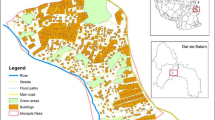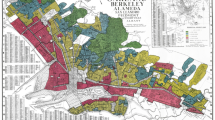Abstract
Human beings have a tendency to transform geographical spaces into dwelling places which assume significance in terms of their social, cultural and personal identities. The authors describe the ways in which this occurs, how it is disrupted by a natural disaster - an Australian bushfire - and how the reciprocal relationship between place and person can contribute to personal and communal healing. The discussion draws on a doctoral thesis conducted by the principal author, and is illuminated by excerpts from narratives provided by those who experienced the bushfire. The discussion is informed by insights from phenomenological geography and ecological philosophy.
Similar content being viewed by others
References
Agnew, J.A. (1989). The Devaluation of Place in Social Science. In J.A. Agnew and J.S. Duncan (Eds.), The Power of Place: Bringing Together Geographical and Sociological Imaginations. Boston: Unwin Hyman.
Agnew, J.A. and Duncan, J.S. (1989). Introduction. In J.A. Agnew and J.S. Duncan (Eds.), The Power of Place: Bringing Together Geographical and Sociological Imaginations. Boston: Unwin Hyman.
Baxter, J. (1984). Who Burned Australia? London: New English Library.
Beck, U. (1992). Risk Society: Towards a New Modernity. Trans. M. Ritter. London: Sage.
Beck, U. (1995a). Ecological Politics in an Age of Risk. Trans. A Weisz. Cambridge: Polity Press.
Beck, U. (1995b). Ecological Enlightenment: Essays on the Politics of the Risk Society. Trans. M. Ritter. Atlantic Highlands, NJ: Humanities Press.
Bedford, 1. (1997) The Australian Bushfire: Diffidence Towards Nature, Gift and Atonement Among Urban Dwellers. The UTS Review 3(l): 107-128.
Berdoulay, V. (1989). Place, Meaning, and Discourse in French language Geography. In J.A. Agnew and J.S. Duncan (Eds.), The Power of Place: Bringing Together Geographical and Sociological Imaginations. Boston: Unwin Hyman.
Bernstein, E. (Ed.) (1998). Ecology and the Jewish Spirit.: Where Nature and the Sacred Meet. Woodstock, VT: Jewish Lights.
Birch, C. (1993). Regaining Compassion for Humanity and Nature. Kensington, New South Wales: New South Wales University Press.
Buttimer, A. (1980). Home, Reach, and the Sense of Place. In A. Buttimer and D. Seamon (Eds.), The Human Experience of Space and Place. New York: St. Martin's Press.
Campbell, J. (1972). Myths to Live By. London: Souvenir Press.
Cassell, E. (1991). The Nature of Suffering and the Goals of Medicine. New York: Oxford University Press.
Codiga, D. (1990). Zen Practice and a Sense of Place. In A.H. Badiner (Ed.), Dharma Gaia: A Harvest of Essays in Buddhism and Ecology. Berkeley: Parallax.
Cosgrove, D. (1993). Landscapes and Myths, Gods and Humans. In B. Bender (Ed.), Landscape Politics and Perspectives. Providence, RI: Berg.
Cox, H.M. (1996). Treading Lightly: An Ecology of Healing. Doctoral thesis. University of Adelaide.
Derr, T.S., Nash, J.A., Neuhaus. RJ. (1997). Environmental Ethics and Christian Humanism. Abingdon Press.
Dowd, M. (1991). Earthspirit: A Handbook for Nurturing an Ecological Christianity. Mystic, Connecticut: Twenty-Third Publications.
Entrikin, J.N. (1989). Place, Region, and Modernity. In J.A. Agnew and J.S. Duncan (Eds.), The Power of Place: Bringing Together Geographical and Sociological Imaginations. Boston: Unwin Hyman.
Godkin, M. (1980). Identity and Place: Clinical Applications Based on Notions of Rootedness and Uprootedness. In A. Buttimer and D. Seamon (Eds.), The human experience of space and place. New York: St. Martin's Press.
Green, L. (1994). Earth age: A New Vision of God, the Human and the Earth. Mahwah, NJ: Paulist Press.
Griffin, D. (Ed.). (1988). The Reenchantment of Science: Postmodern Proposals. New York: State University of New York Press.
Jordan, M. (1993). Myths of the World: A Thematic Encyclopaedia. London: Kyle Cathie.
Kinsley, D.R. (1996). Ecology and Religion: Spirituality in Cross-Cultural Perspective. Upper Saddle River, NJ: Prentice-Hall.
Lang, R. (1985). The Dwelling Door: Towards a Phenomenology of Transition. In D.Seamon and R. Mugerauer (Eds.), Dwelling, Place and Environment: Towards a Phenomenology of Person and World. Dordrecht: Martinus Nijhoff.
Lovejoy, A.O. (1927). 'Nature' as Aesthetic Norm. Modern Language Notes 42:444-450.
McFague, S. (1993). The Body of God: An Ecological Theology. Minneapolis: Fortress Press.
Morphy, H. (1993). Colonialism, History and the Construction of Place: The Politics of Landscape in Northern Australia. In B. Bender (Ed.), Landscape Politics and Perspectives. Providence, RI: Berg.
Oelschlaeger, M. (1994). Caring for Creation: An Ecumenical Approach to the Environmental Crisis. New Haven, CT: Yale University Press.
Oliver, J. (1984). The Ash Wednesday Bushfires in Victoria, 16 February 1983. Townsville, Queensland: Centre for Disaster Studies, James Cook University of North Queensland.
Olwig K. (1993). Sexual Cosmology: Nation and Landscape at the Conceptual Interstices of Nature and Culture; or what does landscape really mean? In B. Bender (Ed.), Landscape Politics and Perspectives. Providence, RI: Berg.
Plumwood, V. (1993). Feminism and the Mastery of Nature. London: Routledge.
Relph, E. (1976). Place and Placelessness. London: Pion.
Riegner, M. (1993). Toward a Holistic Understanding of Place: Reading a Landscape through its Flora and Fauna. In D. Seamon (Ed.), Dwelling, Seeing and Designing: Toward a Phenomenological Ecology. Ablany, NY: State University of New York Press.
Rockefeller, S., Elder, J. (Eds.) (1992). Spirit and Nature: Why the Environment is a Religious Issue. Boston: Beacon Press.
Seamon, D. (1979). A Geography of the Lifeworld: Movement, Rest and Encounter. London: Croom Helm.
Seamon, D. (1985). Reconciling Old and New Worlds: The Dwelling-Journey Relationship as Portrayed in Vilhelm Moberg's “Emigrant” Novels. In D. Seamon and R. Mugerauer (Eds.), Dwelling, Place and Environment: Towards a Phenomenology of Person and World. Dordrecht: Martinus Nijhoff.
Seamon, D, Mugerauer, R. (Eds.) (1985). Dwelling, Place and Environment: Towards a Phenomenology of Person and World. Dordrecht: Martinus Nijhoff.
Skolimowski, H. (1993). A Sacred Place to Swell: Living with Reverence Upon the Earth. Rockport, MA: Element.
Tuan, Y-R (1989). Space and Place: Humanistic Perspective. In S. Gale and G. Olsson (Eds.), Philosophy in Geography. Dordrecht: Reidel.
Weber, R. (1986). Dialogues with Scientists and Sages: The Search for Unity. London: Routledge & Kegan Paul.
Williams, R. (1976). Keywords: A Vocabulary of Culture and Society. London: Fontana.
Author information
Authors and Affiliations
Rights and permissions
About this article
Cite this article
Cox, H.M., Holmes, C.A. Loss, Healing, and the Power of Place. Human Studies 23, 63–78 (2000). https://doi.org/10.1023/A:1005566612706
Published:
Issue Date:
DOI: https://doi.org/10.1023/A:1005566612706




